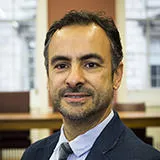18 November 2021
Judgment due in Colombian abortion rights case
An imminent judgment in Colombia, with far-reaching consequences for women’s rights across Latin America, has shone a light again on a submission by staff and students from the Transnational Legal Clinic, which considered abortion rights in the context of international law.

In March 2020, the Colombian Constitutional Court decided not to extend abortion rights. While the Court’s decision disappointed those campaigning for an extension, the apparent divisions between the judges - with those in favour of an extension publishing dissenting positions - served to re-ignite a fierce debate.
Prior to 2006, abortion was banned in Colombia. Under Article 122 of the Criminal Code, it can only currently be justified in three circumstances - when the pregnant woman’s life is at risk, when the pregnancy is the result of rape or incest, and when the fetus has significant health issues. Where these circumstances do not apply, women seeking abortion in Colombia risk imprisonment.
The Court had been asked to additionally allow abortion in the first sixteen weeks of pregnancy.
In October 2020, Professor Octavio Ferraz was approached by Causa Justa, a coalition of Colombian NGOs, activists, health care providers and academic experts. Professor Ferraz was asked to author expert legal advice, to be placed before the Colombian Constitutional Court in a case brought by Causa Justa and the Center for Reproductive Rights on behalf of fourteen Colombian women. The case was seeking to decriminalise abortion on the basis that the current law violates fundamental rights and freedoms.
Professor Ferraz worked with 19 postgraduate students, to research comparative national law and relevant international law and produce a 38-page amicus curiae, or ‘friend of the court’ submission.

Their submission, which runs to over 13,000 words, notes the global trend towards liberalisation of abortion rights, observing that in this area criminal law is seen as a “blunt instrument that fails to achieve its purported aim of protecting fetal life at an inordinate cost to the rights and well-being of women.”
It refers to research by the World Health Organisation which recognises restrictive laws as one reason why women seek unsafe abortions and notes that abortion rates are higher in countries with greater restrictions.
It also notes that the partial decriminalisation offered by the 2006 judgment has failed to limit the number of illegal abortions, possibly “due to stigma, lack of knowledge and clarity about what constitutes a legal abortion, fear of being falsely accused of breaching the law, all of which are fuelled by the continuing existence of the crime of abortion in the Penal Code, irrespective of the exceptions.” Further decriminalisation would “eliminate the inevitable negative consequences of criminalisation and open the door for a more rational and balanced discussion and implementation of parameters by regulatory and professional authorities, ensuring that services are fit for purpose, equitable and primarily developed by those who deliver and those who access abortion services.”
A second part to the submission surveys the international landscape and identifies decriminalisation as a ‘transnational phenomenon’, with progress largely on the basis of the arguments above.
The amicus was accepted by the Court and subsequently mentioned in article on the case in the main Colombian daily newspaper El Tiempo.
Professor Ferraz said: “I was really proud of the hard work that the students put in and the final result. We had to literally work nights and weekends to get it ready by the deadline. This included translating the submission into Spanish - work done by two of our students, from Spain and Mexico.”
The Constitutional Court has until 19 November 2021 to rule in the current case.
The debate in Colombia reflects wider campaigns for abortion rights across Latin America. In the past year, Argentina, Ecuador and Mexico have all extended abortion rights. Abortion is already legal in Uruguay, Guyana, Cuba, Mexico City and the Mexican State of Oaxaca.
Professor Octávio Luiz Motta Ferraz is co-Director of the Transnational Law Institute, a Senior Global Fellow at the Fundação Getúlio Vargas Law School in São Paulo, Brazil and a member of the Bar in São Paulo, Brazil.
This was the first project undertaken by the Transnational Legal Clinic. At the time of the submission the 19 student volunteers were all studying Human Rights Law, Transnational and International Perspectives, a module co-taught by Professor Ferraz and Professor Eva Pils.
The current project of the Transnational Legal Clinic is on police violence and human rights


